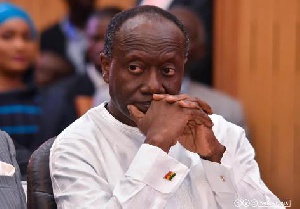 Ken Ofori-Atta, Finance Minister
Ken Ofori-Atta, Finance Minister
The government is working assiduously to reduce poverty and restore dignity to the citizenry through the 2017 budget and subsequent ones, the Minister of Finance, Mr Ken Ofori-Atta, has said.
He said the key to achieving this agenda is to ensure exclusive growth by addressing the challenges of the sectors which host the poor (in this case, crop farmes) and sharing the dividends of the economic growth poles across the other sectors of the economy.
Mr Ofori-Atta said this in a speech read on his behalf at the end of a five-day workshop for Strategy, Planning and Project Implementation.
He said although government had over the years implemented a range of pro-poor programmes such as the Ghana School Feeding Programme, Capitation Grant, Livelihood Empowerment Against Poverty and the National Health Insurance Scheme, the country still faces persisting economic and social inequalities.
Mr Ofori-Atta said this calls for an intensification of efforts rather than abolition; stating that “it is against this backdrop that government seeks to implement critical interventions to address these shortcomings and continue the implementation of existing programmes”.
He said government’s flagship Infrastructure for Poverty Eradication Programme, seeks to consolidate the gains of these interventions.
The workshop, which was organised by the Institute of Applied Science and Technology, University of Ghana is part of the Ghana Economic Well-Being Project.
The project is designed to engage academia, investors and the public in the general economic development of Ghana through the adoption of practical solutions and innovative technologies.
It is a co-operation between Bulaiza PLC and the Institute of Applied Sciences and Technology, University of Ghana.
The Ghana Economic Well-Being Project is an “open source” project allowing any interested party to join as a development partner.
It is, therefore, geared towards participatory engagements with the public and consequently, able to deliver programmes within the framework of the Ghana Economic Well-Being Project.
The workshop outcome would be a very useful resource and aid to policy-makers and the general government agenda for poverty reduction (in Ghana’s, case, eradication).
Mr Ofori-Atta said the Zongo Development Fund (ZDF) intends to improve infrastructure and the lives of people in the Zongo communities, where poverty was endemic.
He said the ZDF would support the provision of critical infrastructure in education and training, health and sanitation, local businesses and centres of culture, as well as improve security in the Zongo communities.
Mr Ofori-Atta said the ZDF was expected to leverage its seed fund to attract additional funding from development partners, private sector institutions and civil society organisations.